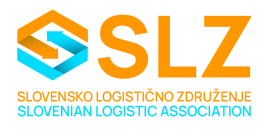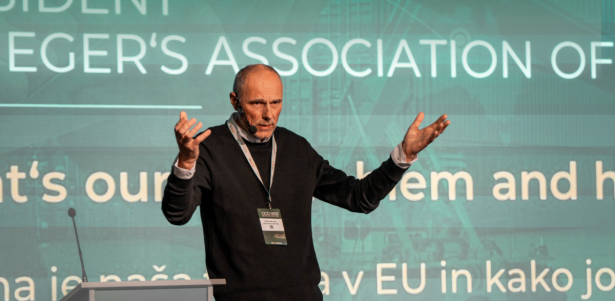News
Europe is Asleep While the World Moves On
12.5.2025
Dr Iztok Seljak, President of the Managers’ Association of Slovenia, on the EU’s strategic stagnation – and the way forward.
At the Logistics Congress 2025, Dr Iztok Seljak outlined the serious crisis facing the European Union: lost competitiveness, unrealised green ambitions, and a lack of strategic unity. His message was clear – Europe is resting on the laurels of its historic dominance, while it is being overtaken by the US and, more significantly, by China.
We used the opportunity to record an additional interview, available exclusively (in Slovene) on Frequency for Logistics (SLZ Knowledge Hub).
The core issue: Europe is stuck in a comfort zone illusion
Since the mid-1990s, Europe has lost more than half of its share in the global GDP – falling from 35% to just 15%. While China is building the future, Europe, according to Seljak, is still sunbathing on a beach under a setting Western sun, unaware of the incoming tsunami from the East.
"Our competitiveness is declining rapidly – we’ve lost our global market share from 35% to 15%. We must admit that we are, or at least should be, in a phase of crisis management, where serious, radical and fast changes are needed in terms of vision, strategy, and their alignment – as well as in restructuring the business model of the European Union itself, which is simply outdated. The EU, in its current form, is dysfunctional and incapable of facing today’s geopolitical challenges." — Dr Iztok Seljak
The green transition – a vision with no execution
The European Green Deal was not the problem in itself – the problem was its inconsistent and poorly implemented execution. Instead of building its own technology and industry, Europe enabled the growth of Chinese solutions through unclear and incoherent policies. The green transition remained largely declarative, lacking real synergy between politics, industry, science and education.
Hidria as an example of what Europe could be
Dr Seljak highlights Hidria as an example of forward-looking strategic thinking. Even before 2010, the company recognised the future of mobility was electric – and today it is active in key breakthrough technologies: electric motors, hydrogen fuel cells, and lightweight materials. In partnership with companies like SIJ, Domel, Iskra Mehanizmi, Kolektor, they are expanding their value chain to Saudi Arabia – not to move production out of Europe, but to strengthen their European position with a global presence, ahead of Chinese, Korean and other competitors.
Why Saudi Arabia?
Because of low costs, green energy, supportive financing, local ambition and the lack of a supply chain for electric vehicles. Together with SIJ, Hidria plans to build a steel plant for the production of electrical steel, a key material for electric motors. This is not a retreat from Europe, but a strategic push towards the future.
Criticism of the EU: The whole is less than the sum of its parts
Seljak stresses that the EU is not acting as a unified strategic entity. Rather than enabling the emergence of strong European champions, it limits mergers and industrial synergies. He sees the future in building robust European ecosystems that can compete globally.
"Europe must begin to function as a single entity. We’ve perhaps mentioned before – or maybe never – that the union of 27 member states should be much more than just the sum of 27 parts. Sadly, we’re now in a situation where it’s actually much less, because each country moves in its own direction." — Dr Iztok Seljak
What does this mean for logistics?
Protectionism will not reduce the need for logistics – quite the opposite. Each regional barrier creates a new need for local presence and supply chains. Logistics will play a key role in the global reorganisation of production, and Slovenia, as a key logistical gateway into the EU, must take advantage of this opportunity.
In his interview, Dr Iztok Seljak issued an important warning: the time of fragmented visions, slow decisions and European complacency is over. Breaking through to the future requires vision, unity, and strategic decision-making – now. Europe can once again become a global innovation leader – if it dares to take risks, collaborate, and look beyond its own borders.
Save the Date: Logistics Congress 2026.
Join us from 8–10 April 2026 in Portorož, Slovenia, as we continue to shape the future of logistics, supply chains, and strategic mobility.
Dr Iztok Seljak started his business career at Rotomatika, a subsidiary of the Hidria Corporation in purchasing, sales and marketing, later he was the CEO of Rotomatika. In 2002, he was promoted to the position of Vice President of the Hidria Corporation. Two years later he took over the management of Hidria Automotive, one of the two core divisions of the Hidria Corporation. Since 2008, he has been the President of Hidria’s Management Board and since 2018 the Managing Director of Hidria Holding, Hidria's parent company. In 2024, he became a member of Hidria's Board of Directors.
He is the President of the Managers’ Association of Slovenia, Coordinator of the Slovenian Automotive Cluster Mission GREMO (GREen MObility), Vice Chairman of the Board of Directors of the Wahaj Industrial Group in Saudi Arabia and Honorary Consul of Hungary in Slovenia.
 sl
sl



